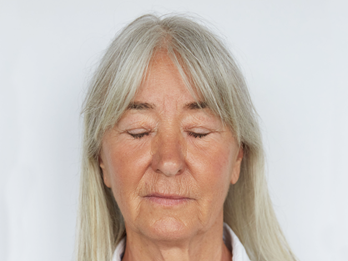Agitation and aggressiveness
They are usually a sign of pain or fear. Agitation is repetitive movements or inappropriate behaviours, such as undressing, yelling, or manipulating objects compulsively. Aggression is all behaviours that hurt, such as hitting or insulting.
How to act?
- Don't yell or hold the person down or make sudden movements.
- Hide dangerous objects within reach.
- Smile to reduce aggressiveness.
- Look into their eyes and approach them little by little.
- Divert attention to something else they like.
- If the person is very aggressive, put yourself in a safe place.
- Do not take it personally and try to forget what happened. Remember that this is a sick person.
Hallucinations and delusions
A hallucination is seeing or hearing something that doesn't exist. A delusion is believing as real something that is false or that has not happened. For example, the person is convinced that he has been robbed and lives it as such, although it is not true. Sometimes people who suffer from hallucinations or delusions are aggressive because they feel fear and discomfort.
How to act?
- Avoid arguing about whether hallucination or delirium is true. If there is no danger, let it be.
- If they are afraid, approach them slowly to reassure them. Tell them who you are with a soft, calm tone of voice.
- Distract them with another topic or activity. Take them to another room or go for a walk.
- Turn off the TV if they give violent programs.
- Check that they hear or see well. For example, check your hearing aid batteries.
- Hide dangerous objects within reach.
- Discuss this with your doctor. Sometimes medication causes hallucinations or delusions.
Insomnia or sleep disorders
By nightfall, people with dementia are more restless, disoriented, irritable and agitated. Insomnia is one of the behavioural problems that most affects caregivers, as it limits their rest.
How to act?
- At dusk try not to be noise at home, lower the light and play relaxing music if the person enjoys it.
- Keep a routine that helps them sleep: don't eat too much dinner or stay hungry, don't drink fluids at night, go to the bathroom before bed, always go to sleep at the same time.
- Limit naps during the day, but make sure the person is rested, as tiredness increases irritability.
- Organize activities that involve physical effort, such as grooming, first thing in the morning.
- If you are frightened by the dark or become disoriented, use night lights in the bedroom, hallway and bathroom.
- If they get up at night, accompany them to the room to reassure and orient them
Possible departure from home
Some people with dementia walk around the house all the time until they get exhausted or even try to go outside.
How to act?
- Make sure that the person is always identified with the ID or a paper with their name and address.
- Tell neighbours or local authorities that they may be inclined to wander.
- Save a recent photograph or video of the person to help the police in case they get lost.
- Keep doors locked. Change the locks if you know how to open them.
- Remove objects from the house that may cause falls.
- Walk with them and try to divert attention with another activity they like.
- Do not force the person to sit, it is better to let him walk.
Inappropriate behaviour
People with dementia do not recognize social norms, and often do inappropriate things, such as undressing in public. The person is usually not aware of their disease, which makes it more difficult to manage.
How to act?
- Put special buttons on clothes so they don't take them off easily.
- React firmly, but calmly. Don't punish them.
- Divert attention.
- Take them to a quiet place and help them get dressed.
- When there are children present, act naturally so as not to generate a greater impact on them.

Cognitive stimulation
It is important that all people, whatever their age, stimulate the brain as part of a healthy habit.
Brain gymnastics keeps neurons active and prevents the onset of dementia. As you get older, cognitive and intellectual functions deteriorate. Memory, attention, orientation, planning ability or language are decreasing differently in each person. There may even be activity centres and support groups local to where you live – speak to your local services provider.
There is also a wide variety of notebooks to stimulate attention and memory. If you're a caregiver or know someone with dementia, you'll understand how important it is to keep your mind active.
Memory
- How would we feel if we lost our memory?
- Would we know who we are?
- What have we achieved?
- Would we be able to love our loved ones, even if we didn't recognise them?
We don't have the answers to these questions. But experts say that, although memories are lost in these diseases, the emotional memory of things is never lost, that is, the emotions that provoked us.
Therefore, it is very important to help people with dementia relive memories. We should not ask them directly if they remember something or someone, we should do it indirectly, for example:
- Discuss old photographs together.
- Remember through the senses, with touch, tastes and smells.
- Label household objects with their names.
- Use those personal objects that evoke good memories.
- Remind them of what has happened during the day and repeat aloud the name of the people they meet, including that of the caregiver.
- Tell them what you are doing to get them to participate in the activity: "Let's eat, I'm going to clean you, I'm going to get you out of bed, etc."



